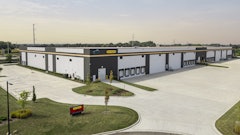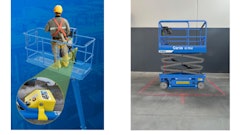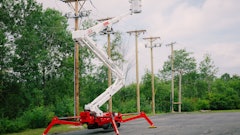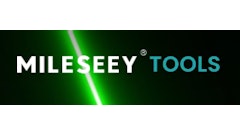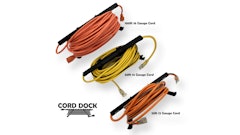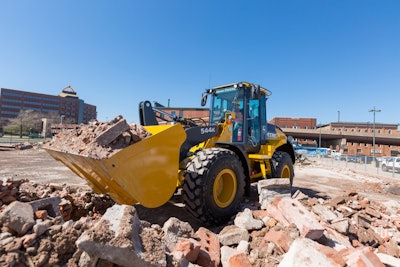
As equipment powered by Tier 4 Final engines becomes more ubiquitous in rental fleets, so too are the questions surrounding service and maintenance. Key to the care and feeding of today's latest engines is that mysterious fluid called DEF (diesel exhaust fluid). Following is some information about DEF to help you manage your Tier 4 equipment for maximum uptime and ROI.
Rental: What exactly is DEF?
Luke Van Wyk, general manager, Thunder Creek Equipment: DEF is comprised of 67.5 percent de-ionized water and 32.5 percent automotive-grade urea. This colorless fluid is not hazardous, but is highly sensitive to chemical impurities and is corrosive to certain metals such as steel, iron, zinc, nickel, copper, aluminum and magnesium. Maintaining the integrity of DEF is imperative in order to protect Tier 4 engines.
Rental: When is DEF needed?
Van Wyk: DEF should always be on hand for equipment operating Selective Catalytic Reduction (SCR) systems. As an aftertreatment solution, the machine could de-rate if the DEF tank is empty. That affects machine performance and productivity, and then requires someone to run back to the shop or a retail outlet to purchase new DEF. As a rule of thumb most equipment manufacturers are recommending that the DEF tank is filled at the same time as the fuel tank. There are solutions for the field that store DEF in a closed system ranging from 50-gallon totes that fit into the bed of a pickup, 100-gallon tanks incorporated into larger fuel and service trailers, and stand-alone bulk DEF trailers that can haul as much as 990 gallons. These solutions ensure a constant source of quality DEF in the field, and can be provided as a service or rental add-on by rental houses.
Rental: Where can it be bought?
Van Wyk: DEF can be bought now in any range of automotive, commercial goods or equipment locations, but the method of delivery can be an issue. Understand, however, that all DEF may not be the same. ISO22241 lays out the specific guidelines for the manufacture, dispensing, and handling of DEF. Always be sure you are buying DEF from a reliable source that is following that standard.
DEF is susceptible to contamination. Using small containers or jugs and filling the tank with a funnel exposes the fluid to dirt, oils, greases and other fluids that may have been poured into that funnel. Some people have transferred it into containers previously used for other fluids, then poured it into the machine. Others have mixed their own using agricultural-grade urea – always a no-no. These examples are ripe for contamination. In markets where DEF use is more mature, the results show that as much as 70% of the issues of DEF quality are a direct result of improper customer handling.
We believe there’s a great opportunity for equipment dealers and independent equipment rental locations to become a source for DEF that meets required quality standards – and that’s largely because no one has more riding on the use of certified DEF than equipment owners. Using contaminated or poor quality DEF or improper handling can lead to equipment downtime and higher lifetime owning and operating costs.
We recommend the use of a closed system that ensures the DEF is not exposed to any outside elements before being pumped into the machine’s DEF tank via a fuel-style nozzle, ensuring fluid purity. This can be accomplished relatively easily: an equipment dealer or rental house keeps a bulk IBC DEF tote in their shop, which can then be connected via a closed pumping system to a smaller tote or bulk tank on a trailer for transfer to the field. The DEF is then pumped via that fuel-style nozzle into the tank, ensuring the fluid is never exposed to the elements before it reaches the tank.
Rental: How much should a rental company keep on hand?
Van Wyk: It all depends on the size of your fleet and your equipment. Lower-horsepower equipment, such as skid steers and backhoes, feature smaller DEF tanks. Larger, higher-horsepower equipment, such as wheel loaders, excavators and backhoes, consume more and feature larger tanks. This will vary from fleet to fleet, but DEF has a good shelf life if stored properly – so equipment owners shouldn’t worry about keeping a good quantity on hand for the sake of convenience. The rule of thumb is that in many engines DEF consumption will be 3-8% of fuel consumption.
Rental: How should it be stored, what precautions go with it?
Van Wyk: In accordance with the ISO standard, a number of manufacturers and suppliers suggest that DEF always be stored and transferred via a closed system that protects it from outside contaminants and impurities. DEF should be handled in dedicated containers that were manufactured specifically for use with DEF, made with materials approved in the ISO standard and rinsed and sealed accordingly. Do not reuse or refill open containers.
As little as 1/10th of a teaspoon of many common elements is enough to bring an entire 5,000-gallon tank of DEF off-spec, according to the ISO 22241 standard. These contaminants include Copper, Zinc, Chromium, Nickel, Iron, Aluminum, Phosphorous, Magnesium, Calcium, Sodium and Potassium. Even something as simple as tap water can bring DEF off-spec.
Prolonged exposure to direct sunlight and high temperatures will cause DEF to degrade. Stored under average temperatures of 50°F, DEF is good for 36 months. This reduces to 18 months at 77°F, 12 months at 86°F and just six months for DEF that is consistently exposed to temperatures above 96°F.
DEF freezes at 12°F, so follow these guidelines in colder climates:
- DEF expands by approximately 7% when frozen. Prevent fully filled, closed containers and pumping systems from freezing, as this can cause damage. There are solutions on the market that include a heating element to ensure this doesn’t happen.
- Be sure DEF is completely thawed before use.
- Do not use additives to prevent freezing as this can lead to contamination.
Rental: How much does it cost and how often does the tank need to be filled?
Van Wyk: Price will vary based on location and retailer. That’s another great benefit to equipment rental locations: buying DEF in bulk allows that rental business to acquire DEF at a lower price and provide it to their renters at competitive rates.
Each machine will be different in terms of how often the DEF tank needs to be filled. As a rule of thumb, most equipment manufacturers are recommending that the DEF tank is filled at the same time as the fuel tank. Follow OEM-required intervals, and always pay attention to the DEF gauge made available in most machines to ensure the machine always has a suitable volume of DEF available.



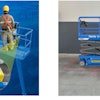

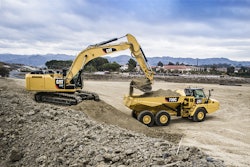
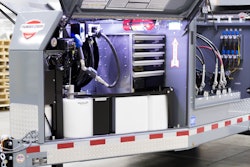
![[VIDEO] Thunder Creek Explains the Rental Opportunity in DEF](https://img.forconstructionpros.com/files/base/acbm/fcp/image/2016/02/default.56cddeda435ff.png?auto=format%2Ccompress&fit=crop&h=167&q=70&w=250)

